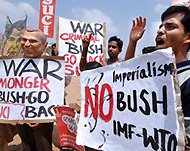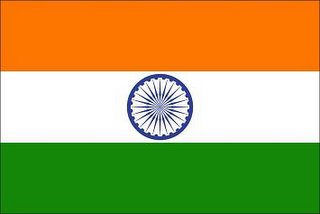US and India strike nuclear deal
Aljazeera, 02 March 2006 George Bush and Manmohan Singh, the Indian prime minister, have started talks in New Delhi and agreed a nuclear deal that effectively bypasses international conventions on proliferation.
George Bush and Manmohan Singh, the Indian prime minister, have started talks in New Delhi and agreed a nuclear deal that effectively bypasses international conventions on proliferation.
The deal is expected to give India access to Western technology, as well as bilateral economic ties and co-operation in space travel, agriculture and health, officials on both sides said.
Critics charge the agreement undermines non-proliferation goals and marks a major turnaround for the US which for three decades spearheaded a drive to deny India nuclear technology becuase New Delhi developed nuclear weapons in violation of international norms. Both India and nuclear-armed Pakistan have refused to sign the nuclear Non-Proliferation Treaty. ...
Both India and nuclear-armed Pakistan have refused to sign the nuclear Non-Proliferation Treaty. ...
New Delhi has placed its police force of 71,000 officers on high alert and sealed off the hotel where Bush will stay during the trip, the second to India by a US president in six years. ...
Bush said: "I've never been to India before and I've been looking forward to this trip for a long time. I am looking forward to working with the president and prime minister to foster a very important relationship."
He then paid a visit to Rajghat, the memorial to Indian freedom fighter Mahatma Gandhi, where he laid a wreath amid tight security.
Meanwhile, thousands of Muslim and leftist protesters have gathered in the Indian capital in protest against Bush's visit.
Dozens of politicians stood on the steps of the country's national parliament building chanting "Bush go back!" and "Down with Bush!"
Hannan Mollah, an MP from the Communist Party of India, said: "Our one slogan is: 'Bush go back!' We're saying this because he is the biggest killer of humanity in the 21st century. He has killed in Afghanistan, he has killed Iraqis and now he is bent on killing Iranians." ...
Television channels citing Indian sources said progress had been made in the talks, which included Stephen Hadley, the US national security adviser, and MK Narayanan, his Indian counterpart , but some differences remained.
Despite six months of negotiations leading up to Bush's visit, officials have been unable to tie down the deal under which the US would extend nuclear technology to India if it agreed to separate its military and civilian atomic facilities.
India is reluctant to place some of its civilian reactors, such as the plutonium-based fast breeder system, under international scrutiny. Some US experts feel that the deal rewards India for testing nuclear weapons in May 1998 and sets a bad example for countries such as Iran and North Korea which have signed the nuclear 1972 Non-Proliferation Treaty, unlike New Delhi. ...
Some US experts feel that the deal rewards India for testing nuclear weapons in May 1998 and sets a bad example for countries such as Iran and North Korea which have signed the nuclear 1972 Non-Proliferation Treaty, unlike New Delhi. ...
The deal commits Washington to get approval from the US Congress and countries of the Nuclear Suppliers Group to lift restrictions on sharing nuclear technology with India put in place after its first nuclear tests in 1974. ...
source
Thursday, March 2, 2006
rules:make them, break them
Posted by audacious at 2.3.06
Subscribe to:
Post Comments
(Atom)










































0 comments:
Post a Comment